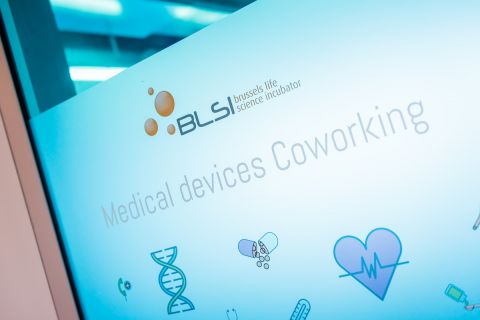The Brussels Life Science Incubator (BLSI) provides candidate entrepreneurs with a brand-new coworking space devoted to medical devices so that Brussels can become a major player in this technological sector which offers many opportunities in terms of economic development and patient involvement in the quality of their own care.
A first in Belgium
In order to make the most of the new opportunities that have emerged in this health technologies sub-sector, the Brussels Life Science Incubator (BLSI) has set up the first Belgian coworking space devoted to medical devices at its facility. It will help to boost projects thanks to personalised support and immersion in a favourable ecosystem.
The personalised support is offered in partnership with Covartim, which ensures the role of mentor on site, in order to share its cutting-edge and recognised expertise in medical devices from the validation of ideas through to marketing.
A booming sector experiencing great change
The health technology sector is the leading sector in Belgium in terms of the number of start-ups, coming ahead of financial technologies and industrial production. In Brussels, in an economy in which innovation is dominated by information and communication technologies, e-health takes the lion's share when it comes to the number of new projects. However, although only a short while ago it represented an almost confidential niche market, the medical devices sector has experienced a boom in the past 3 to 4 years. There are already more than 250 companies active in this sector in our country.
This sudden success is driven, on the one hand, by increasingly efficient miniaturisation, which makes medical devices much more effective and much less invasive. Furthermore, the growing availability of technological bricks as a result of the combination of artificial intelligence and big data will invariably generate disruptive applications, in the same way as in many other sectors.
On the other hand, the public authorities also play a key role. Indeed, on a European level, the bodies competent in the regulation of medical devices have focused recently on increasing requirements in terms of quality and patient safety. Although this will increase the time to market, these new regulations offer the advantage of clarifying the classification of medical devices, thus reducing the uncertainty feared so much by entrepreneurs. Finally, aware of the economic potential and social effects of new health technologies, European governments are increasingly opening up patient databases in such a way as to boost the development of new products and services which will significantly improve the quality of care in the coming years.
Europe is aiming to catch up with the United States
In the United States, the FDA – Food and Drug Administration – took the initiative a few years ago of becoming heavily involved in drawing up clear regulations which greatly stimulated the medical devices sector. Heavyweights such as Apple, Amazon and Google literally rushed into this niche and it is already possible to see the concrete results. For example, in September 2018, the FDA gave its approval to Apple for its latest generation of smartwatches, the Apple Watch Series 4. These will be able to perform an electrocardiogram and potentially identity an irregular heart beat in real time. Although this prospect raises new questions about ethics and the guarantee of the quality of care, the process is inexorably in motion.
A favourable ecosystem around the BLSI
Inaugurated in 2012 on the initiative of the Brussels-Capital Region and the Université Catholique de Louvain, the BLSI currently hosts 31 young companies with an average age of 2 years, for a total of 85 jobs. The incubator's start-ups are profitably integrated into three complementary networks: the incubator's community, Brussels' public organisations that support entrepreneurship and R&D, and UCLouvain research units.
Located on the same campus as the Dental, Pharmacy and Public Health Faculties, five internationally famous health research institutes, and the Saint-Luc university clinics, it is also worth noting the presence of Louvain Bionics, a multidisciplinary research centre for the design of surgical, diagnostic and rehabilitation devices.
The BLSI's residents and its coworkers will have the opportunity of building vital relationships for the fruitful development of their activities.
For more information:
Gianluigi ARIALDI
CEO
BLSI
Email: g.arialdi@blsincubator.com
Tel : +32 (0)2 880 62 17 - Fax : +32 (0)2 880 62 01
Web : www.blsincubator.com
